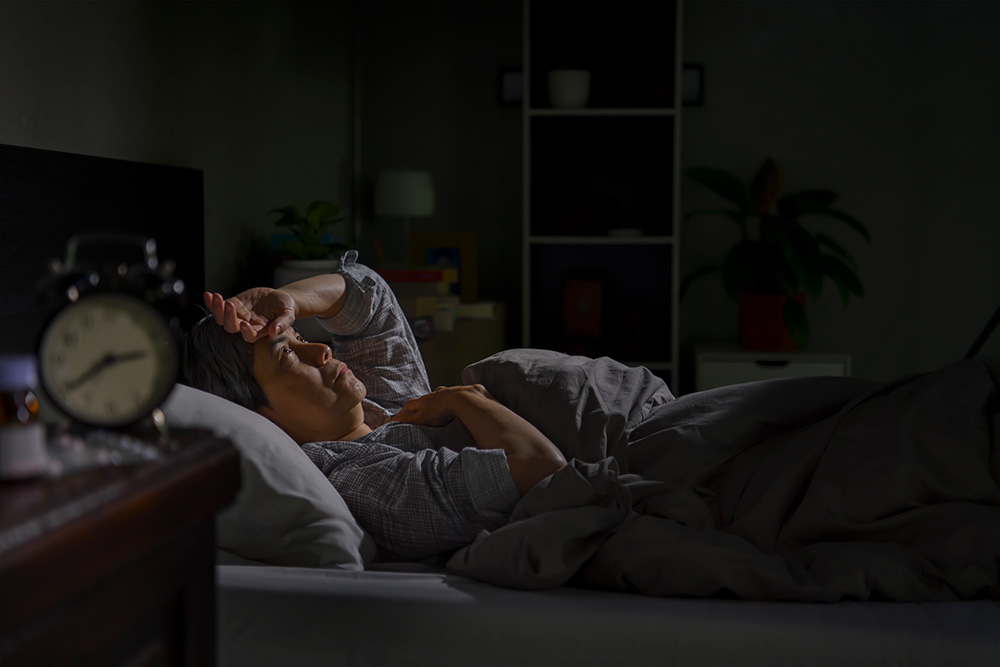Shakespeare already told us, more than four centuries ago, that summer nights are more for love, revelry, and worldly delight than for sleeping. But the enchanting fairies from his “A Midsummer Night’s Dream” (1595) are not the only ones to blame for enthroning Cupid and scaring away Morpheus in this season: science attributes our summer insomnia to a combination of factors. To begin with, sleep duration is shorter than in winter, as confirmed by research conducted in Japan. “In summer, there tends to be a social jet lag, people go to bed later, and it’s hard to tell children to go to bed when it’s still daylight,” explains Milagros Merino, specialist in clinical neurophysiology and president of the Spanish Sleep Society (SES). “Minimal comfort conditions are needed to sleep, but we’re experiencing temperatures of 31 and 32 degrees Celsius at midnight. With all the heat emitted by air conditioning units, combined with the heat accumulated on the asphalt, it’s infernal,” concludes the coordinator of the sleep disorders unit at La Paz University Hospital in Madrid.
“Until we detect a significant drop in temperature, we don’t feel like sleeping,” clarifies Juan Antonio Madrid Pérez, professor of Physiology at the University of Murcia and expert in chronobiology, a discipline that studies biological rhythms. Naturally, body temperature drops one or two hours before going to bed to facilitate sleep and continues to decrease while sleeping, something that is hindered by heat, as explained by this expert who will publish “Chronobiology: A Guide to Discover Your Biological Clock” in September (Plataforma Actual). In addition to sleeping less time, our sleep is of poorer quality. “It’s more fragmented, more superficial. Firstly, because it’s hotter, the number one enemy of sleep, but there’s also more noise. In cities, people go to bed later, more parties are organized,” adds Madrid Pérez, recalling that in Spain, festivals and popular parties usually take place in July and August. In fact, in noisy areas at night, such as some parts of downtown Madrid, those without air conditioning have to choose between keeping the windows closed and not sleeping due to the heat, or opening them and not sleeping due to the noise. “Local governments should pay much more attention to this issue,” demands the specialist.
Summer Sleep Struggles: How Heat Affects Our Slumber
As the summer months approach, many of us may find ourselves struggling to get a good night’s sleep. According to Milagros Merino, president of the Spanish Sleep Society (SES), “in summer, we tend to experience a social jet lag, with people going to bed later.”
A 2021 study published in the journal Sleep Health monitored the sleep quality of 41 households in Shanghai, tracking temperature, humidity, noise levels, and CO2 concentrations. The researchers found that the most comfortable temperature and humidity levels for sleep were 24.8°C and 64%, respectively. They also discovered that higher temperatures and CO2 levels had a greater impact on men’s sleep, while noise levels affected women’s sleep more significantly.
Furthermore, research has shown that older adults and children are the most affected by heat when it comes to sleep. Madrid Pérez, an expert in sleep medicine, explains that “from the age of 60 or 65, there is a greater sensitivity to temperature changes, with a one-degree increase in nighttime temperature affecting older adults twice as much as younger individuals.” Additionally, the brain’s ability to regulate body temperature and sleep is impaired in older adults, making it more difficult for them to sleep in hot weather.
On the other hand, infants and young children are also more susceptible to temperature extremes due to the immaturity of their brain’s temperature regulation mechanisms. As Madrid Pérez notes, “babies and older adults are the most affected by extreme temperatures.”
Moreover, the normal sleep cycle is disrupted in the summer months, with the heat affecting the different stages of sleep differently. Madrid Pérez explains that “when we sleep more superficially, as we do in hot weather, we lose sleep in stage 3, which is the most restorative stage of sleep.” This stage is crucial for physical and mental recovery, and its disruption can lead to fatigue, decreased cognitive function, and other negative effects.
In addition to heat, noise and light also pose problems for sleep in the summer. The longer days and increased light exposure can alter our biological rhythms, making it more difficult to fall asleep and stay asleep. As Madrid Pérez points out, “the fact that we have more hours of daylight in the summer affects our circadian rhythms, making it harder to sleep.”
Overall, the summer months can be challenging for our sleep, and it’s essential to take steps to mitigate the effects of heat, noise, and light on our slumber. By maintaining a cool sleep environment, using earplugs or white noise machines to block out noise, and using blackout curtains or shades to block out light, we can improve the quality of our sleep and wake up feeling rested and refreshed.
A one-degree rise in nighttime temperature affects older people twice as much as younger ones.
One of the hormones that changes the most with darkness is melatonin, produced by the pineal gland in the brain when it determines that night has arrived. “In chronobiology, we call it subjective night because it’s the one marked by your biological clock, not necessarily your wristwatch,” explains Madrid Pérez, who is also responsible for Cronolab, the chronobiology laboratory at the University of Murcia. This clock regulates that subjective night based on personal patterns of exposure to light and darkness or dinner schedules, the expert continues. “Social media activity is also influencing this delay,” he adds.
Genes also play a role: “We have individuals who are morning types, others evening types, and others in between. A morning person will start their biological night two, three, or four hours earlier than an evening person,” he considers. “When that night arrives, your biological clock stimulates the pineal gland to secrete melatonin if darkness is maintained simultaneously. If we turn on the light during the night, it won’t be produced because it needs both conditions simultaneously,” he emphasizes. But in summer, it’s all different: “Around six-thirty or seven in the morning, we already have daylight and melatonin decreases, while at night, we function until late with artificial light.” In other words, we sleep less and produce less of the hormone that would favor our sleep and body recovery.
The Best Advice
So, how do we lure back the Greek god of dreams? “What we need to do is boring,” anticipates Merino. On the one hand, there are general measures valid in any season:
Consistency is key: “We need regular schedules that our brain can predict and adapt to over time,” emphasizes Madrid Pérez. Ideally, our waking or sleeping schedule should not change more than an hour or an hour and a half between days, weekends included.
Dim light before bedtime: Subjective night is altered by the amount of light present before sleeping, and darkness stimulates the production of melatonin, so bright lights should be dimmed, and even consider using a sleep mask. “If you receive light from mobile phones, tablets, or computers, your brain interprets that it’s still daytime because it’s the one that most stimulates your biological clock. If we need to use screens, they should be low intensity two hours before sleeping,” advises Madrid Pérez.
Welcome daylight: Unlike at night, exposing ourselves to morning light helps regulate circadian rhythms, so going outside is recommended. However, early filtering light may wake us up prematurely.
Prepare for sleep during the day: “We can’t arrive at bedtime with our brain functioning at 100%, after responding to emails or working late, we need to disconnect,” warns Madrid Pérez. How much time? “It depends on the person: some need an hour, others two.”
Proper ventilation: CO₂ accumulated in closed rooms, especially if they are small or shared, can affect sleep. When the carbon dioxide we exhale increases or decreases oxygen, the brain sends signals to wake up, as in patients with apnea, exemplifies Madrid Pérez. “They are micro-awakenings of a few seconds that we don’t perceive, but they do affect the depth and fragmentation of sleep.” Let’s ventilate, therefore, before sleeping and during the night.
Avoid stimulants and heavy dinners: “We should avoid consuming alcohol, tobacco, or caffeine drinks late in the day. If we notice the effect of coffee, ideally the one after lunch should be the last,” suggests Merino. Dinner should be two or two and a half hours before bed and not too abundant because digestion hinders deep and restorative sleep.
Exercise at the right times: “We shouldn’t do very stimulating activities towards the end of the day,” reiterates Merino. “Morning exercise is more advisable, it will keep you in a state of greater relaxation and mental and physical balance throughout the day. Also, if you do it outside, it will mean exposure to natural morning light, which is very healthy,” explains Madrid Pérez. “Intense exercise two hours before bedtime, ruled out; moderate exercise or walking, perfect.”
And specifically for summer, specialists recommend the following:
Improve bedroom temperature: “We need to cool the brain to sleep,” says Madrid Pérez. “If the room is not below 26°C, we have no choice but to use air conditioning or a fan,” he considers. Opening windows and raising blinds only early or at dusk may help.
Take a tepid shower: Although counterintuitive, three specialists from Swinburne University of Technology in Australia explained in The Conversation why showering with water at around 33⁰C is more effective for staying cool in summer than cold water. The latter reduces blood flow to the skin and, therefore, heat loss, which leads to an unwanted heating of our core body and, minutes later, discomfort returns. Conversely, the warm sensation on the skin causes cutaneous vasodilation, increasing heat loss and greater comfort after a few minutes.

